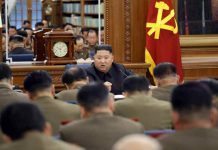Economic woes caused by the pandemic continue to affect the lives of North Koreans throughout the country. With the country is running low on finances, a wide range of products remain unavailable while people struggle to purchase daily necessities at higher prices. Although the fall harvest was expected to reduce prices to some extent, the difference in prices has remained minor, with ordinary people feeling the pinch.
Locals in Yangang Province are reportedly disappointed that prices have not fallen as anticipated this autumn while expressing concern about next year’s food supply. The price of items that were in high demand such as cooking oil, seasonings and sugar are falling, but from the perspective of locals, prices are still very high compared to what they were before the pandemic.
Even if locals can manage to find Chinese goods in markets, prices are reportedly so high due to the lack of imports that ordinary people can’t afford them. For example, although Chinese shampoo was selling for around RMB 30 (about USD 4.65) before the pandemic, prices recently skyrocketed to as high as RMB 800 (about USD 123). Even staple items such as cabbage necessary to make kimchi have become unaffordable for many North Koreans, resulting in them having to give up making winter kimchi for the second straight year.
Last month, the central government reportedly issued an order to provincial authorities to find ways to better supply daily necessities to the people and “build a new commercial network.” The order called on authorities to draw up a basic design plan by the end of November and begin operations of the new network by the end of the year. As a result of the order, North Hamgyong Province is conceptualizing a plan that would operate provincial markets in accordance with current conditions, while inviting private investment to build new general stores of various sizes in densely populated areas, or to expand existing stores.

What’s more, faced with foreign exchange shortages, North Korean authorities reportedly plan to send a new batch of workers overseas. Pyongyang plans to send over 1,000 workers within the year, mainly to Russia to work in logging camps. North Korean authorities plan to send them in two or three batches, the first of which is scheduled to depart in early-to-mid November.
Despite international sanctions, the situation is dire enough for the government to make such moves. In fact, the government has been unable to print banknotes lately, resulting in the issuing of money coupons called “donpyo.” These coupons are now being used in major cities at certain stores instead of banknotes due to a shortage of ink and paper. Local sources, however, say the government has not adequately completed preparations to roll out a large-scale implementation of these money coupons yet. Even the capital city of Pyongyang has not received enough money coupons to distribute to all who need them.
Although the government is making attempts to improve the economic situation on some fronts, it has also been engaging in more crackdowns. State media reported on Sunday of last week that the government had established new laws to strengthen organizational control over markets and financial systems. One law particularly stands out: the Law on Electronic Transactions. The law is likely aimed at expanding the use of electronic payment methods while also strengthening the government’s control of this sector. Although debit cards and QR payments have been introduced in North Korea in recent years, their use remains limited mainly to elites living in Pyongyang.
Besides enacting new laws, the North Korean government is also doubling down on its efforts to “strengthen socialism” within the country. According to a report by KCNA last weekend, “ensuring the balanced and simultaneous development of all the fields of the country” is key to defend socialism and “in building a powerful country.” North Korea’s Rodong Sinmun has also been posting an increasing amount of articles promoting an “ideological offensive”: “Under the present situation where everything is in short supply, the biggest reserve and a main key to the creation and innovation lies in displaying the mental power of the popular masses,” an Oct. 29 article read.
Although the government is paying increased attention to its economic policies, this does not mean military plans have taken a back seat. Last month, Kim Jong Un reportedly ordered that the Ministry of Defense’s Weapons Bureau be “enlarged and reorganized” as a result of their “excellent contributions.”
This indicates Kim’s desire to quickly modernize and diversify weapons and launch systems to build North Korea’s self-defense capacity as well as a perceived need to push the modernization of the country’s arsenal to strengthen its “nuclear deterrent” as called for during the Eighth Party Congress at the start of the year. The order may also reflect Pyongyang’s intention to break through the country’s difficulties by strengthening national defense.
Views expressed in Guest Columns do not necessarily reflect those of Daily NK.




















